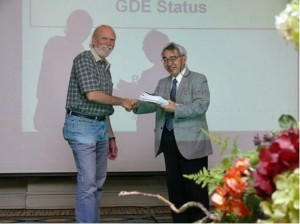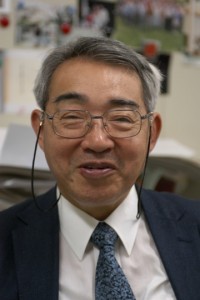It is with special pleasure that I pay tribute today to Professor Shin-ichi Kurokawa, who was awarded this year’s Rolf Widerøe Prize by the European Physical Society Accelerator Group. Shin-ichi was cited for his “outstanding leadership in the design, construction and operation of several high-energy accelerators, including the KEK PS, TRISTAN and the KEK B-Factory. Through his intensive participation in the international collaboration within ACFA and ICFA, he initiated and expanded worldwide scientific exchange, building sturdy bridges of understanding and collaboration between Japan, Asia and the rest of the world.” For the ILC, he is as responsible as any single individual in making the word ‘global’ in Global Design Effort a reality.
The Global Design Effort (GDE) for the International Collider was created by the International Committee for Future Accelerators (ICFA) and its subcommittee, the International Linear Collider Steering Committee (ILCSC) in 2005, following the important technology decision to base the design on superconducting radiofrequency technology. The GDE is organised geographically into European, American and Asian regions with equal representation for GDE management and responsibilities for the technical developments and design.
Making the Asian region a reality was, to a large extent, due to the tireless work of Shin-ichi Kurokawa, who travelled almost continuously through Asia to put together this collaboration. He has also played leading roles in ICFA, ILCSC and the Asian Committee for Future Accelerators (ACFA). We owe him much for laying the groundwork for our important and successful Asian efforts in the GDE.
Shin-ichi Kurokawa graduated in physics from the Tokyo Institute of Technology in1966 and received his Sc.D. in physics in 1972. He came to the laboratory as an experimental particle physicist, but soon became involved in accelerator physics and joined the Accelerator Department in 1981. He has worked on particle physics accelerators since that time. Among other accomplishments, he successfully led the KEKB project and has headed the KEK accelerator division. He has played an important role in developing and exploiting 30 years of accelerators for particle physics in Japan, and over the last decade has been instrumental in globalising the design efforts for the ILC.

The author presented the ILC Reference Design to Kurokawa in his role as chair of the ILCSC in 2007.
Rolf Widerøe was a Norwegian physicist who is credited with originating many of the concepts used in particle accelerators. These concepts included using magnetic induction to accelerate electrons, which is called a betatron. He also developed resonance acceleration using radiofrequency electric fields. These concepts were basic to the development of particle accelerators. Despite his brilliant scientific career, he became a well-known Nazi collaborator, resulting in his Norwegian citizenship being revoked. After World War II, he continued his career by working on radiation therapy for cancer and early collaboration at CERN.
It has been a pleasure for all of us in the ILC GDE to have worked with Shin-ichi Kurokawa. On behalf of my colleagues and me, we give him our hearty congratulations for this most deserving award.



Dear Professor Kurokawa,
Heartiest Congratulations!
With warm regards + best wishes
Sameen Ahmed KHAN
Engineering Department
Salalah College of Technology,
Salalah, Sultanate of OMAN. http://SameenAhmedKhan.webs.com/